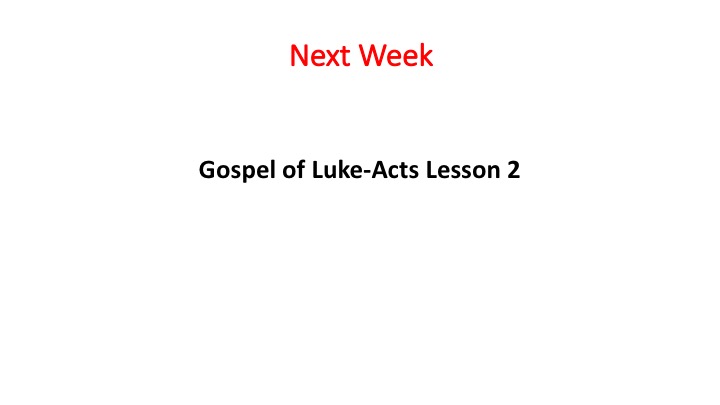Jesus and the Gospels Lesson 6
Luke-Acts I
Mike Ervin
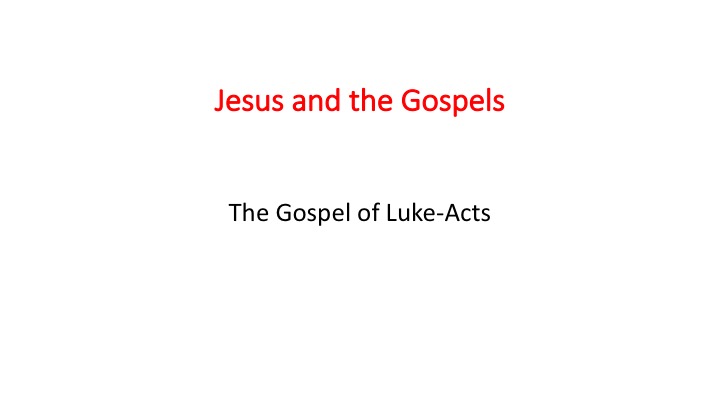
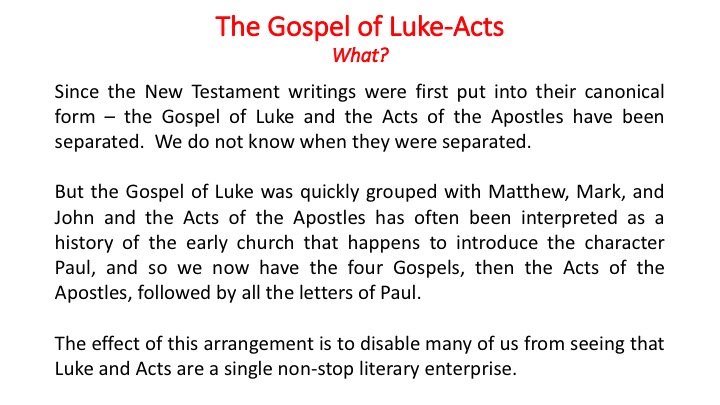
The Gospel of Luke-Acts
What?
Since the New Testament writings were first put into their canonical form – the Gospel of Luke and the Acts of the Apostles have been separated. We do not know when they were separated.
But the Gospel of Luke was quickly grouped with Matthew, Mark, and John and the Acts of the Apostles has often been interpreted as a history of the early church that happens to introduce the character Paul, and so we now have the four Gospels, then the Acts of the Apostles, followed by all the letters of Paul.
The effect of this arrangement is to disable many of us from seeing that Luke and Acts are a single non-stop literary enterprise.
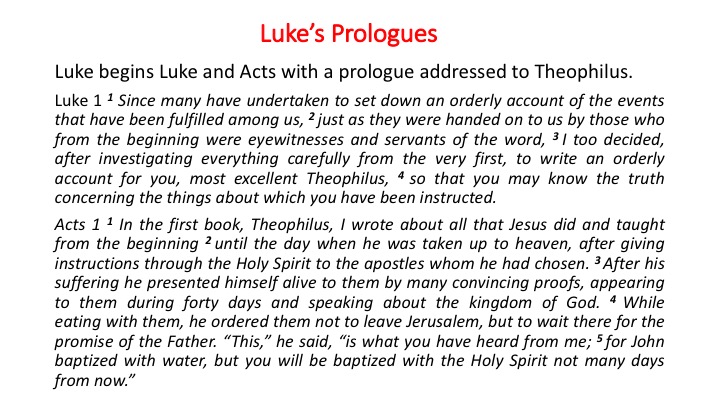
Luke’s Prologues
Luke begins both Luke and Acts with a prologue of introduction addressed to Theophilus.
Luke 1
1 Since many have undertaken to set down an orderly account of the events that have been fulfilled among us, 2 just as they were handed on to us by those who from the beginning were eyewitnesses and servants of the word, 3 I too decided, after investigating everything carefully from the very first, to write an orderly account for you, most excellent Theophilus, 4 so that you may know the truth concerning the things about which you have been instructed.
Acts 1
1 In the first book, Theophilus, I wrote about all that Jesus did and taught from the beginning 2 until the day when he was taken up to heaven, after giving instructions through the Holy Spirit to the apostles whom he had chosen. 3 After his suffering he presented himself alive to them by many convincing proofs, appearing to them during forty days and speaking about the kingdom of God. 4 While eating with them, he ordered them not to leave Jerusalem, but to wait there for the promise of the Father. “This,” he said, “is what you have heard from me; 5 for John baptized with water, but you will be baptized with the Holy Spirit not many days from now.”
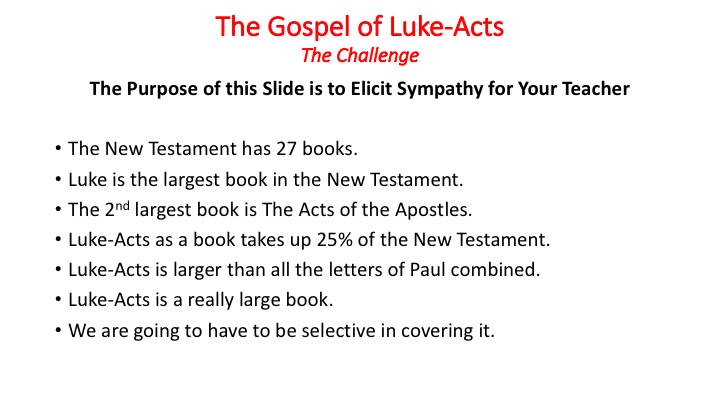
The Gospel of Luke-Acts
The Challenge
The New Testament has 27 books.
Luke is the largest book in the New Testament.
Luke-Acts as a book takes up 25% of the New Testament.
Luke-Acts is larger than Matthew Mark, and John combined.
Luke-Acts is larger than all the letters of Paul combined.
Luke-Acts is a really large book.
We are going to have to be selective in covering it.
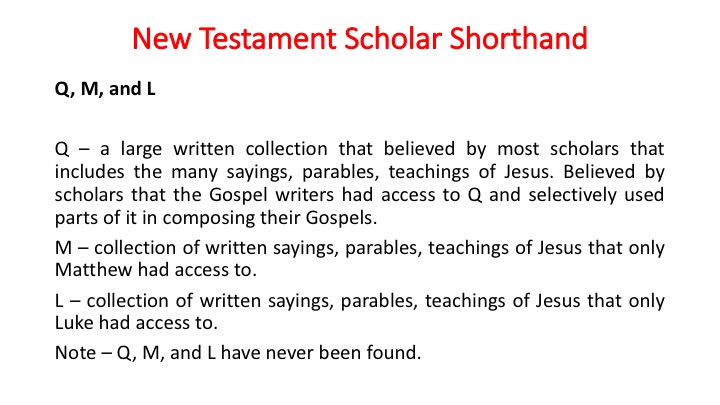
New Testament Scholar Shorthand
Q, M, and L
Q – a large written collection that believed by most scholars that includes the many sayings, parables, teachings of Jesus. Believed by scholars that the Gospel writers had access to Q and selectively used parts of it in composing their Gospels.
M – collection of written sayings, parables, teachings of Jesus that only Matthew had access to.
L – collection of written sayings, parables, teachings of Jesus that only Luke had access to.
Note – Q, M, and L have never been found.
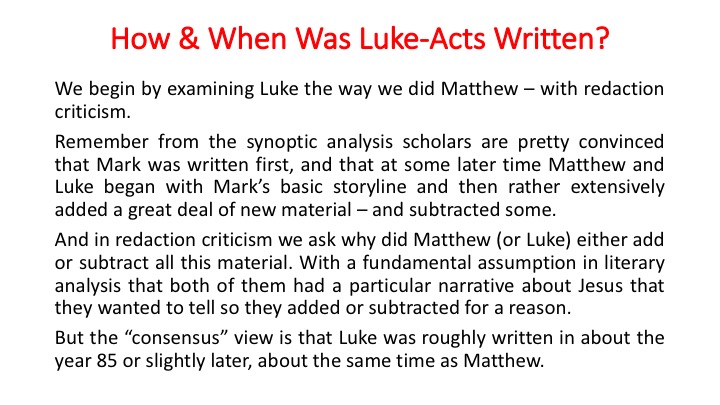
How & When Was Luke-Acts Written?
We begin by examining Luke the way we did Matthew – with redaction criticism.
Remember from the synoptic analysis scholars are pretty convinced that Mark was written first, and that at some later time Matthew and Luke began with Mark’s basic storyline and then rather extensively added a great deal of new material – and subtracted some.
And in redaction criticism we ask why did Matthew (or Luke) either add or subtract all this material. With a fundamental assumption in literary analysis that both of them had a particular narrative about Jesus that they wanted to tell so they added or subtracted for a reason.
Regarding "when", the “consensus” view is that Luke was roughly written in about the year 85 or slightly later, about the same time as Matthew.
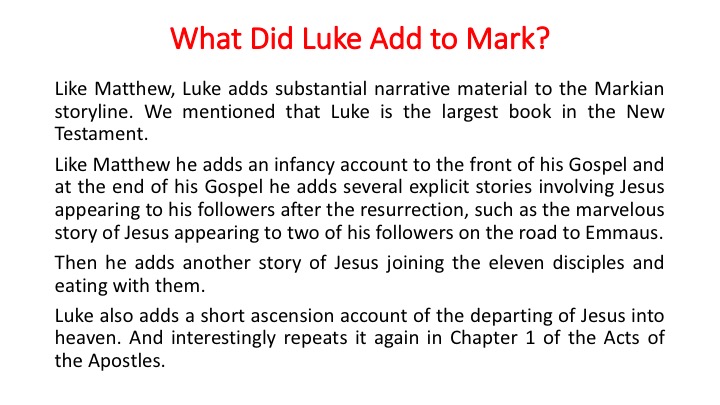
What Did Luke Add to Mark?
Like Matthew, Luke adds substantial narrative material to the Markian storyline. We mentioned that Luke is the largest book in the New Testament.
Like Matthew, Mark adds an infancy account to the front of his Gospel and at the end of his Gospel he adds several explicit stories involving Jesus appearing to his followers after the resurrection, such as the marvelous story of Jesus appearing to two of his followers on the road to Emmaus.
Then he adds another story of Jesus joining the eleven disciples and eating with them.
Luke also adds a short ascension account of the departing of Jesus into heaven. And interestingly repeats it again in Chapter 1 of the Acts of the Apostles.
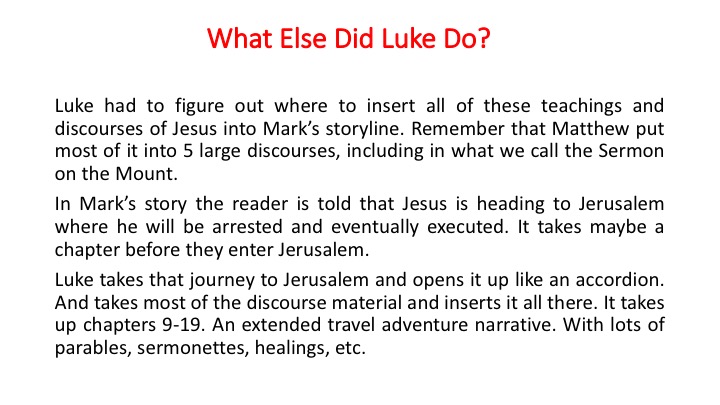
Luke had to figure out where to insert all of these teachings and discourses of Jesus from Q into Mark’s storyline. Remember that Matthew put most of it into 5 large discourses, including in what we call the Sermon on the Mount.
In Mark’s story the reader is told that Jesus is heading to Jerusalem where he will be arrested and eventually executed. It takes maybe a chapter before they enter Jerusalem.
Luke takes that journey to Jerusalem and opens it up like an accordion. And takes most of the discourse material and inserts it all there. It takes up chapters 9-19. An extended travel adventure narrative. With lots of parables, sermonettes, healings, etc.
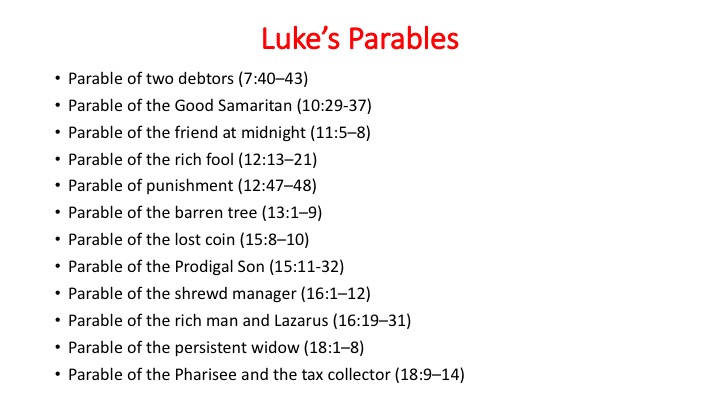
Lukian Parables - some of the best.
Parable of the Prodigal Son (15:11-32)
Parable of the Good Samaritan (10:29-37)
Parable of two debtors (7:40–43)
Parable of the friend at midnight (11:5–8)
Parable of the rich fool (12:13–21)
Parable of punishment (12:47–48)
Parable of the barren tree (13:1–9)
Parable of the lost coin (15:8–10)
Parable of the shrewd manager (16:1–12)
Parable of the rich man and Lazarus (16:19–31)
Parable of the persistent widow (18:1–8)
Parable of the Pharisee and the tax collector (18:9–14)
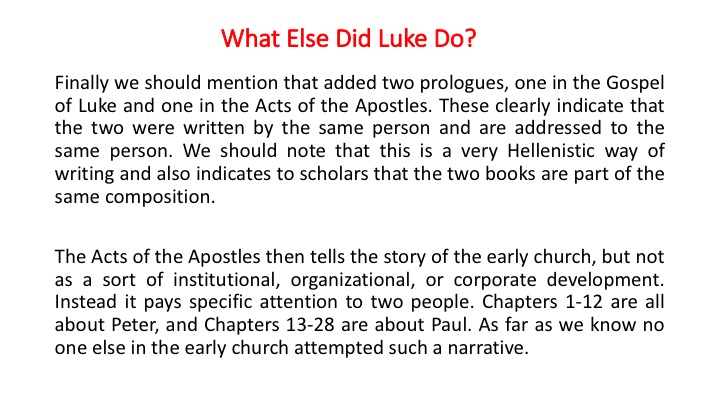
What Else Did Luke Do?
Finally we should mention that added two prologues, one in the Gospel of Luke and one in the Acts of the Apostles. These clearly indicate that the two were written by the same person and are addressed to the same person. We should note that this is a very Hellenistic way of writing and also indicates to scholars that the two books are part of the same composition.
The Acts of the Apostles then tells the story of the early church, but not as a sort of institutional, organizational, or corporate development. Instead it pays specific attention to two people. Chapters 1-12 are all about Peter, and Chapters 13-28 are about Paul. As far as we know no one else in the early church attempted such a narrative.
It should be noted that in focusing only on Peter and Paul's contribution The Acts of the Apostles gives a limited history of the early church. There were 10 other apostles who were certainly also spreading the Gospel, and we know that churches were established as far away as India in the east and Egypt in the west but we have very limited information on those activities.
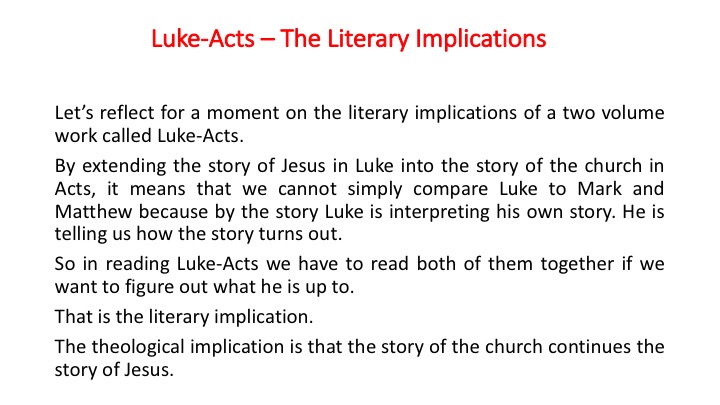
Luke-Acts – The Literary Implications
Let’s reflect for a moment on the literary implications of a two volume work called Luke-Acts.
By extending the story of Jesus in Luke into the story of the church in Acts, it means that we cannot simply compare Luke to Mark and Matthew because by the story Luke is interpreting his own story. He is telling us how the story turns out.
So in reading Luke-Acts we have to read both of them together if we want to figure out what he is up to. That is the literary implication.
The theological implication is that the story of the church continues the story of Jesus.
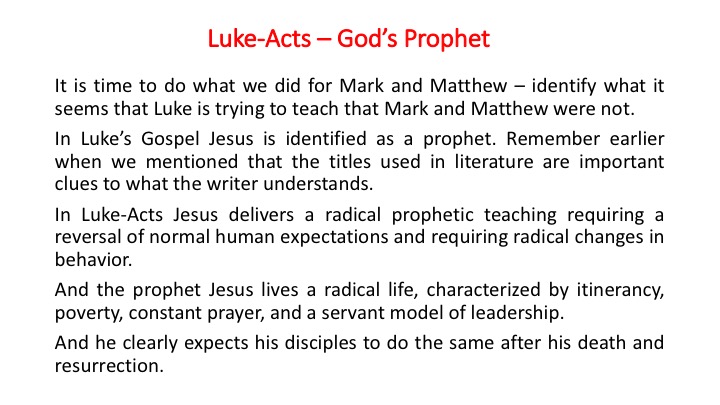
Luke-Acts – God’s Prophet
It is time to do what we did for Mark and Matthew – identify what it seems that Luke is trying to teach that Mark and Matthew were not.
In Luke’s Gospel Jesus is identified as a prophet. Remember earlier when we mentioned that the titles used in literature are important to understand how titles are used.
In Luke-Acts Jesus delivers a radical prophetic teaching requiring a reversal of normal human expectations and requiring radical changes in behavior.
And the prophet Jesus lives a radical life, characterized by itinerancy, poverty, constant prayer, and a servant model of leadership.
And he clearly expects his disciples to do the same after his death and resurrection.
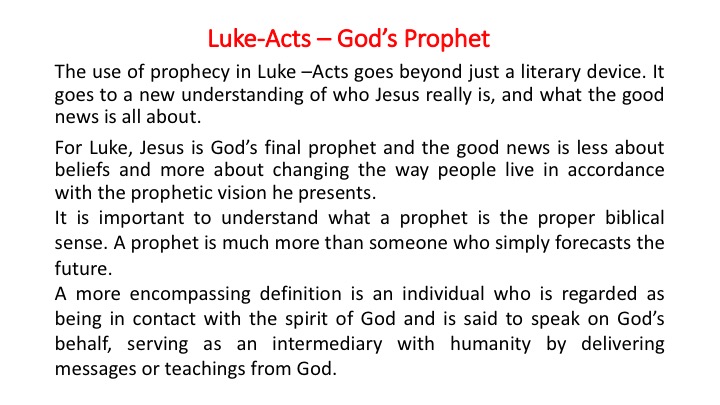
Luke-Acts – God’s Prophet
The use of prophecy in Luke - Acts goes beyond just a literary device. It cuts to a new understanding of who Jesus really is, and what the good news is all about.
For Luke, Jesus is God’s final prophet and the good news is less about beliefs and more about changing the way people live in accordance with the prophetic vision he presents.
It is important what a prophet is the proper biblical sense. A prophet is much more than someone who simply forecasts the future.
A more encompassing definition is an individual who is regarded as being in contact with the spirit of God and is said to speak on that God's behalf, serving as an intermediary with humanity by delivering messages or teachings from from God.
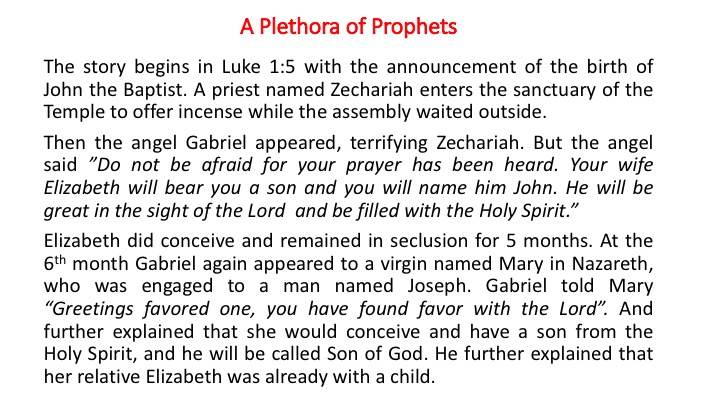
A Plethora of Prophets
Immediately after the prologue in Luke 1 verse 5 the story of the birth of John the Baptist begins.
A priest named Zechariah enters the sanctuary of the Temple to offer incense while the assembly waited outside.
Then the angel Gabriel appeared, terrifying Zechariah. But the angel said ”Do not be afraid for your prayer has been heard. Your wife Elizabeth will bear you a son and you will name him John. He will be great in the sight of the Lord and be filled with the Holy Spirit.
Elizabeth did conceive and remained in seclusion for 5 months. At the 6th month Gabriel again appeared to a virgin named Mary in Nazareth, who was engaged to a man named Joseph. Gabriel told Mary “Greetings favored one, you have found favor with the Lord”. And further explained that she would conceive and have a son from the Holy Spirit, and he will be called Son of God. He further explained that her relative Elizabeth was already with a child.
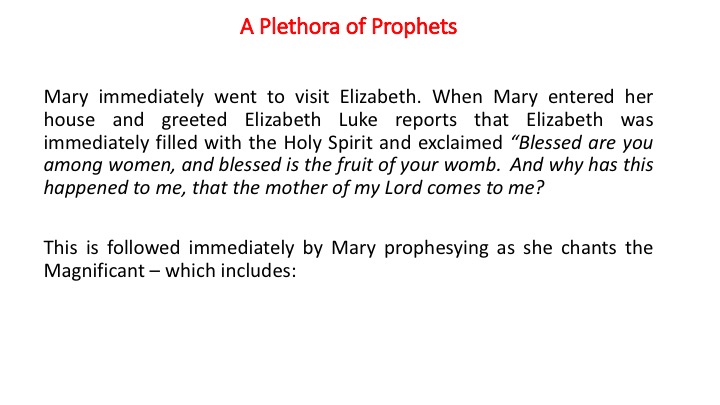
A Plethora of Prophets
Mary immediately went to visit Elizabeth. When Mary entered her house and greeted Elizabeth Luke reports that Elizabeth was immediately filled with the Holy Spirit and exclaimed (and prophesied) “Blessed are you among women, and blessed is the fruit of your womb. And why has this happened to me, that the mother of my Lord comes to me?
This is followed immediately by Mary prophesying as she chants the Magnificant – which includes:
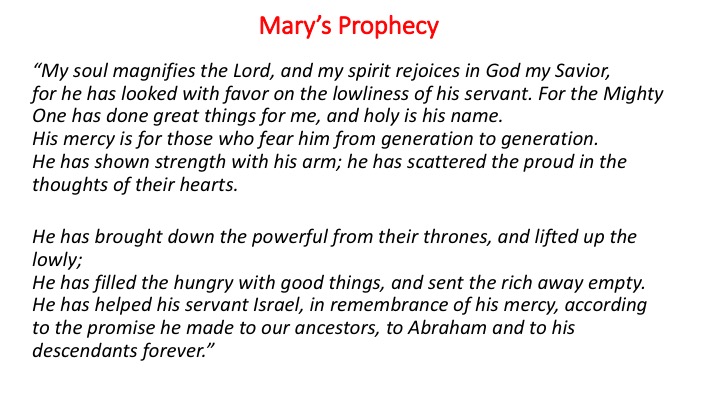
Mary’s Prophecy
“My soul magnifies the Lord, and my
spirit rejoices in God my Savior,
for he has looked with favor on the lowliness of his servant. for the Mighty
One has done great things for me, and holy is his name.
His mercy is for those who fear him from generation to generation.
He has shown strength with his arm; he has scattered the proud in the thoughts
of their hearts.
He has brought down the powerful from their thrones, and lifted up the
lowly;
He has filled the hungry with good things, and sent the rich away
empty.
He has helped his servant Israel, in remembrance of his mercy, according to the
promise he made to our ancestors, to Abraham and to his descendants forever.”
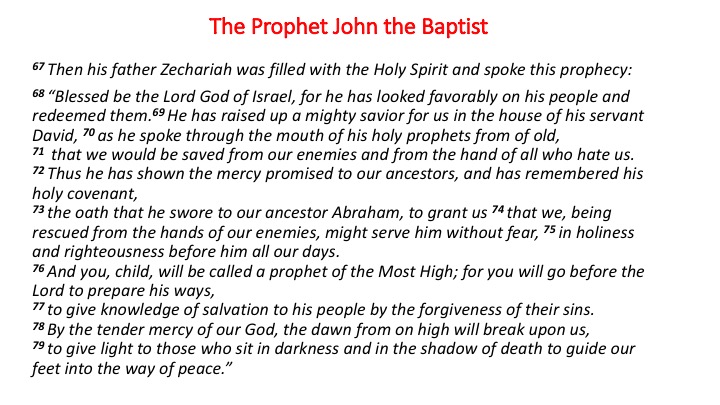
The Prophet John the Baptist
When John the Baptist was born his father Zechariah picked up the child and was filled with the Holy Spirit and spoke this prophecy:
68 “Blessed
be the Lord God of Israel, for
he has looked favorably on his people and redeemed them.
69 He
has raised up a mighty savior for
us in
the house of his servant David,
70 as
he spoke through the mouth of his holy prophets from of old,
71 that
we would be saved from our enemies and from the hand of all who hate us.
72 Thus
he has shown the mercy promised to our ancestors,
and
has remembered his holy covenant,
73 the
oath that he swore to our ancestor Abraham, to
grant us 74 that
we, being rescued from the hands of our enemies, might
serve him without fear, 75 in
holiness and righteousness before
him all our days.
76 And
you, child, will be called the prophet of the Most High;
for
you will go before the Lord to prepare his ways,
77 to
give knowledge of salvation to his people
by
the forgiveness of their sins.
78 By
the tender mercy of our God,
the
dawn from on high will break upon us,
79 to
give light to those who sit in darkness and in the shadow of death, to
guide our feet into the way of peace.”
Notice in verse 76 that Zechariah also forecasts that the child (John) will be a prophet of the most High God.
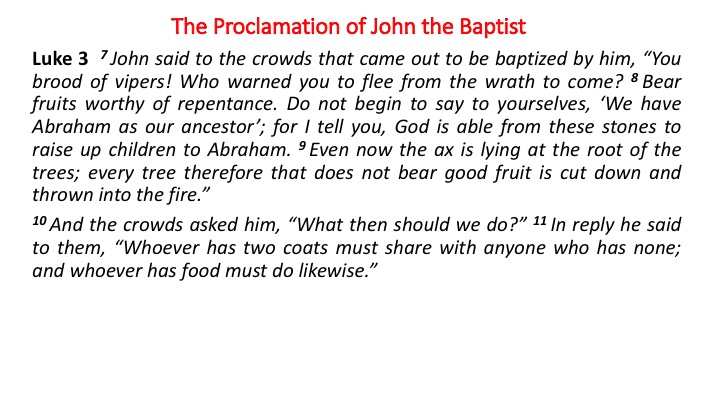
The Proclamation of John the Baptist
Luke 3 7 John said to the crowds that came out to be baptized by him, “You brood of vipers! Who warned you to flee from the wrath to come? 8 Bear fruits worthy of repentance. Do not begin to say to yourselves, ‘We have Abraham as our ancestor’; for I tell you, God is able from these stones to raise up children to Abraham. 9 Even now the ax is lying at the root of the trees; every tree therefore that does not bear good fruit is cut down and thrown into the fire.”
10 And the crowds asked him, “What then should we do?” 11 In reply he said to them, “Whoever has two coats must share with anyone who has none; and whoever has food must do likewise.” 12 Even tax collectors came to be baptized, and they asked him, “Teacher, what should we do?” 13 He said to them, “Collect no more than the amount prescribed for you.” 14 Soldiers also asked him, “And we, what should we do?” He said to them, “Do not extort money from anyone by threats or false accusation, and be satisfied with your wages.”
Note that John the Baptist, unlike his role in Mark and Matthew is now playing the role of a prophet - he is highly critical - and is not only warning them of their current thinking but of what they need to now do - they need to bear fruits of their repentance.
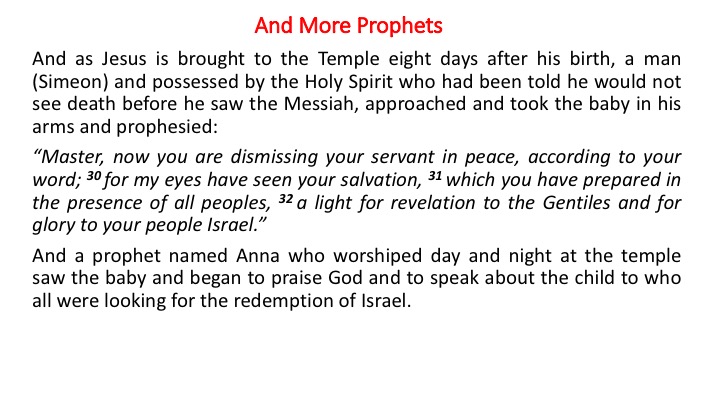
And More Prophets
And as Jesus is brought to the Temple eight days after his birth, a man (Simeon) and possessed by the Holy Spirit who had been told he would not see death before he saw the Messiah, approached and took the baby in his arms and prophesied:
“Master,
now you are dismissing your servant[h] in
peace, according to your word;
30 for
my eyes have seen your salvation,
31 which
you have prepared in the presence of all peoples,
32 a
light for revelation to the Gentiles and for glory to your people Israel.”
And a prophet named Anna who worshiped day and night at the temple saw the baby and began to praise God and to speak about the child to who all were looking for the redemption of Israel.
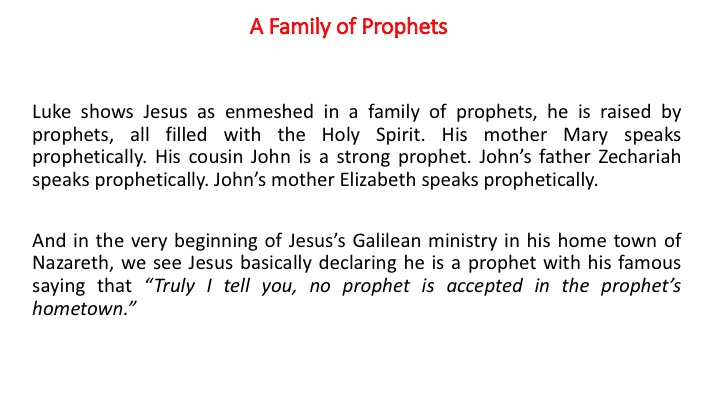
A Family of Prophets
Luke shows Jesus as enmeshed in a family of prophets, he is raised by prophets, all filled with the Holy Spirit. His mother Mary speaks prophetically. His cousin John is a strong prophet. His Uncle Zechariah speaks prophetically. His aunt Elizabeth speaks prophetically.
And in the very beginning of Jesus’s Galilean ministry in his home town of Nazareth, we see Jesus basically declaring he is a prophet with his famous saying (only in Luke) that ““Truly I tell you, no prophet is accepted in the prophet’s hometown.”
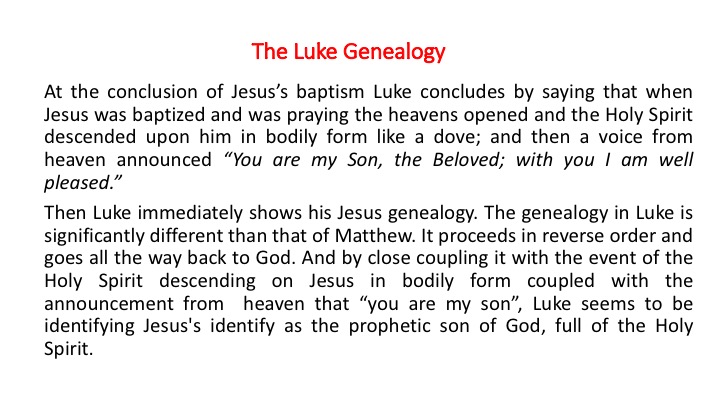
The Luke Genealogy
At the conclusion of Jesus’s baptism Luke concludes by saying that when Jesus was baptized and was praying the heavens open and the Holy Spirit descended upon him in bodily form like a dove and then a voice from heaven announced “You are my Son, the Beloved; with you I am well pleased.”
Then Luke immediately shows his Jesus genealogy. The genealogy in Luke is significantly different than that of Matthew. It proceeds in reverse order and goes all the way back to God. And by close coupling it with the event of the Holy Spirit descending on Jesus in bodily form coupled with the announcement from heaven that “you are my son”, Luke seems to be identifying Jesus's identify as the prophetic son of God, full of the Holy Spirit.
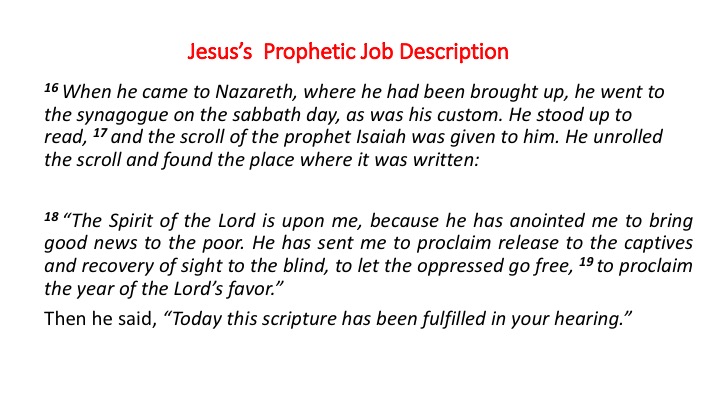
Jesus’s Prophetic Job Description
16 When he came to Nazareth, where he had been brought up, he went to the synagogue on the sabbath day, as was his custom. He stood up to read, 17 and the scroll of the prophet Isaiah was given to him. He unrolled the scroll and found the place where it was written:
18 “The
Spirit of the Lord is upon me,
because he has anointed
me
to bring good news to the
poor.
He has sent me to proclaim release to the captives
and recovery of sight to the
blind,
to let the oppressed go
free,
19 to
proclaim the year of the Lord’s favor.”
20 And
he rolled up the scroll, gave it back to the attendant, and sat down. The eyes
of all in the synagogue were fixed on him. 21 Then
he began to say to them, “Today this scripture has been fulfilled in your
hearing.”
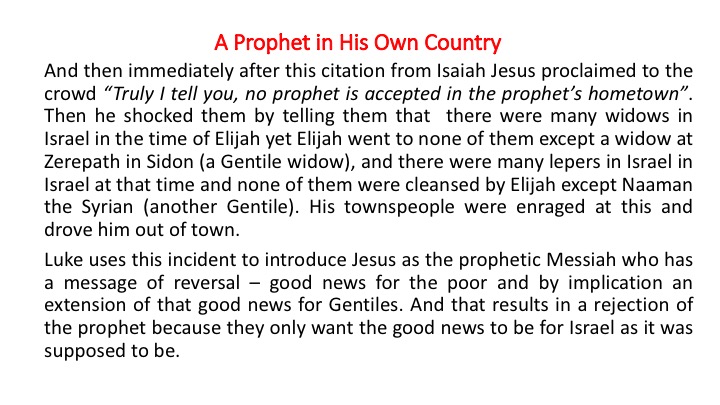
A Prophet in His Own Country
And then immediately after this citation from Isaiah Jesus proclaimed to the crowd “Truly I tell you, no prophet is accepted in the prophet’s hometown”. Then he shocked them by telling them that there were many widows in Israel in the time of Elijah yet Elijah went to none of them except a widow at Zerepath in Sidon (a Gentile widow), and there were many lepers in Israel in Israel at that time and noe of them were cleansed by Elijah except Naaman the Syrian (another Gentile). His townspeople were enraged at this and drove him out of town.
Luke uses this incident to introduce Jesus as the prophetic Messiah who has a message of reversal – good news for the poor and by implication an extension of that good news for Gentiles. And that results in a rejection of the prophet because they only want the good news to be for Israel as it was supposed to be.
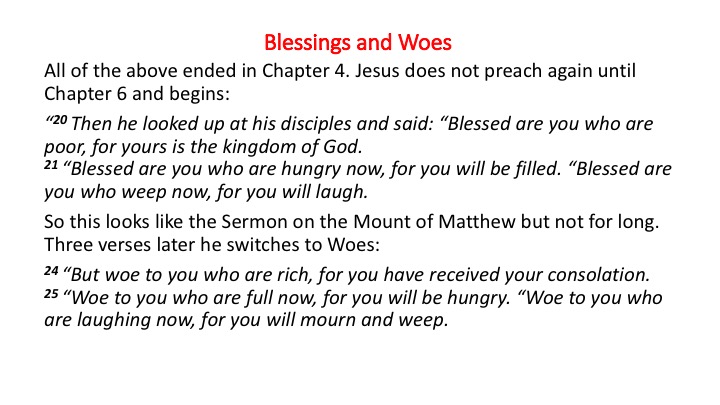
Blessings and Woes
All of the above ended in Chapter 4. Jesus does not preach again until Chapter 6 and begins: “20 Then he looked up at his disciples and said:
“Blessed
are you who are poor,
for yours is the kingdom of God.
21 “Blessed
are you who are hungry now,
for you will be filled.
“Blessed are you who weep now,
for you will laugh.
So this looks somewhat like the Sermon on the
Mount of Matthew but not for long. Three verses later he switches to Woes: 24 “But
woe to you who are rich,
for
you have received your consolation. 25 “Woe
to you who are full now, for you will be hungry. “Woe to you who are
laughing now, for you will mourn and weep.
Interestingly this looks more like how Moses presented the Torah to the Israelites, as blessings and curses. Jesus uses blessings and woes. And the woes are exact counterpoints to each of the previous blessings.
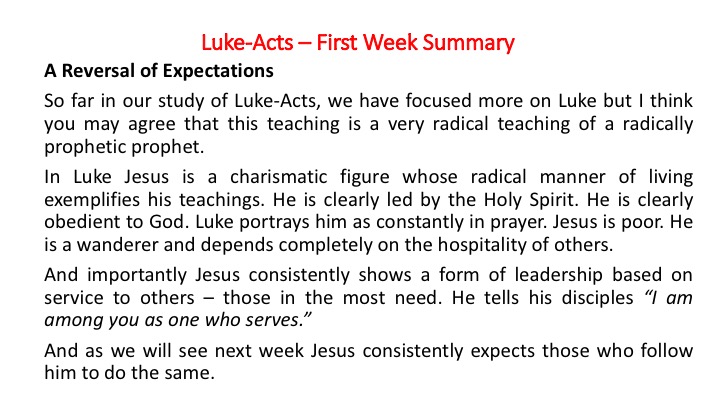
Luke-Acts – First Week Summary
A Reversal of Expectations
So far in our study of Luke-Acts, we have focused more on Luke but think you may agree that this teaching is a very radical teaching of a radically prophetic prophet.
In Luke Jesus is a charismatic figure whose radical manner of living exemplifies his teachings. He is clearly led by the Holy Spirit. He is clearly obedient to God. Luke portrays him as constantly in prayer. Jesus is poor. He is a wanderer and depends completely on the hospitality of others.
And importantly Jesus consistently shows a form of leadership based on service to others – those in the most need. He tells his disciples “I am among you as one who serves.”
And as we will see next week Jesus consistently expects those who follow him to do the same.
